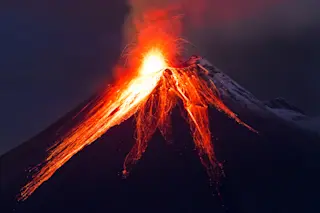(Credit: Shutterstock) Earth’s worst day happened 66.043 million years ago — give or take 32,000 years. Let’s say it was a Monday. And if it was, then around Friday afternoon a strange new star would’ve begun growing brighter and brighter in the sky. Tragically, it wasn’t a cool new star at all. It was a Mount Everest-sized space rock traveling 45,000 mph. Surprise! The asteroid was so gargantuan, that as its leading edge plunged into the Gulf of Mexico, you would have seen the other side was still higher than a cruising 747 jetliner. Of course, if you saw the fireball, you wouldn’t be around long enough to worry about the aftermath. But things were pretty terrible for anything that survived. Earth’s vegetation burned that day. Then the sulfur and soot blocked out the sun, eventually killing everything larger than 55 pounds in a sort of nuclear winter. And if ...
Did The Dino-Killing Asteroid Trigger Global Volcanoes?
Discover the shocking dinosaur apocalypse aftermath, including surprising twelfth magnitude earthquakes and volcanic eruptions.
More on Discover
Stay Curious
SubscribeTo The Magazine
Save up to 40% off the cover price when you subscribe to Discover magazine.
Subscribe













